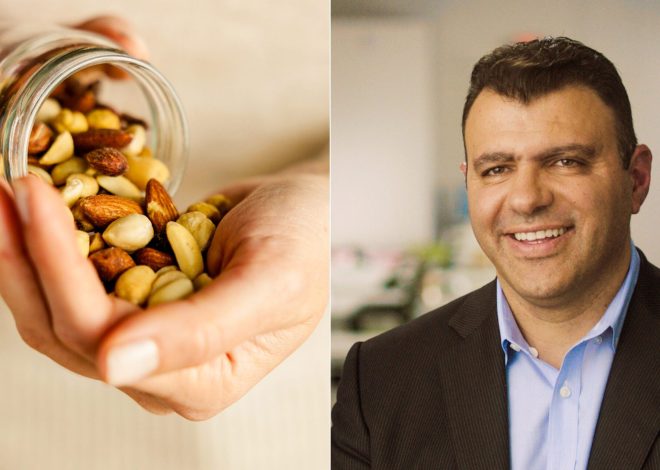
Harvard professor: 3 nutritional tips to live healthier

A researcher who studies processed foods says the work has inspired him to make his own diet healthier.
After identifying a link to health risks, he restricted the consumption of certain foods.
Instead, he prefers whole foods, high-fiber snacks, and meals with recognizable ingredients.
Chicken nuggets used to be a convenient and popular dinner option for Taylor Kimberly and his family. But after learning more about highly processed foods and how they affect the brain, he’s switched to grilled chicken instead.
Kimberly is a professor of neurology at Harvard Medical School and a neurologist at Massachusetts General Hospital. He is the lead author of a new study linking ultra-processed foods to health risks such as dementia and stroke.
“Since we started this study, I’ve been more careful about what I eat,” he told Business Insider (BI). “But I’ll be honest, there are a lot of foods that I enjoy and I haven’t eliminated them all.”
Read also
While it’s not news that highly processed foods are linked to poor health, the latest study not only helps us understand which foods are healthy or unhealthy, it also helps us learn how to make small, healthy changes without cutting them out entirely.
Kimberly says, “Highly processed foods are such an important part of our diet. They’re convenient and easy. There hasn’t been as much thought put into them, not just the type of food, but how it’s processed.”
The findings, published June 11 in the journal Neurology, help scientists understand why processed foods may be bad for our health. The study is observational, meaning it can’t directly say whether processed foods cause the health risks.
However, it does provide some pointers on simple ways to make healthier choices, says Kimberly, including tips on choosing more nutritious snacks and limiting the amount of processed foods you eat.
Read also
1. Even avoiding two servings of processed foods per week can help
When Kimberly and his team began their study, their goal was to provide some actionable advice for people. Is it possible to slightly reduce your consumption of processed foods—without cutting them out entirely—and thereby improve your health? Their research suggests it is possible.
Their study found that a 10 percent increase in processed food consumption was associated with a higher risk of cognitive impairment. That’s about two meals a week. The research team based their analysis on this figure because it was a realistic amount for people to cut back on. It’s also an easy goal to achieve.
“The answer we found is that we are moving the needle, and that makes us very optimistic,” Kimberly said. “Diet is really hard to change. There are many reasons why we eat what we eat, such as time, convenience and budget. All of these factors impact our eating habits.”
2. Choose whole foods with lots of fiber like nuts and seeds
Years of research have shown that processed foods are harmful in some ways. They often lack fiber and protein, as well as vitamins and minerals. They also introduce unhealthy ingredients like added oil, sugar, salt and preservatives into your diet. This means that you can’t counteract the effects of a junk food diet by popping a few multivitamins or drinking a green juice.
Read also
Kimberly says, “If you’re not eating a healthy meal, you’re eating an unhealthy meal, so you can’t just add a supplement. When it comes to brain health, both sides are important.”
The good news is that replacing highly processed foods with healthier alternatives can have a double benefit by adding nutrients while eliminating potentially harmful additives.
For example, if you replace French fries with baked sweet potatoes, you’ll not only reduce the salt and oil in your diet, but you’ll also get more vitamins and minerals. Kimberly’s research inspired him to snack on nuts or carrots instead of cookies or crackers. This allows him to reduce his sugar intake and quickly increase the fiber in his diet. “We’re not just feeding ourselves when we eat. We’re feeding a really complicated ecosystem in the gut that helps us metabolize our food,” says Kimberly.
3. Pay attention to ingredients thatr knows
You don’t have to cut out processed foods entirely to improve your health. If you’re going to go for something cheap and convenient, choosing healthier processed foods that have recognizable ingredients can help, Kimberly says. “If you look at that and think, ‘I could make that in my kitchen,’ that’s a good indicator.”
Read also
In the long run, making a few small changes that you can stick with can be more helpful than trying to conspire against processed foods forever—and failing. “In a perfect world, we would all eat unprocessed foods, but that’s not the reality,” says Kimberly. “It’s not a sprint. Short, big changes are not the goal. Even modest changes, if they’re sustainable, can make a difference.”

Ethel Purdy – Medical Blogger & Pharmacist
Bridging the world of wellness and science, Ethel Purdy is a professional voice in healthcare with a passion for sharing knowledge. At 36, she stands at the confluence of medical expertise and the written word, holding a pharmacy degree acquired under the rigorous education systems of Germany and Estonia.
Her pursuit of medicine was fueled by a desire to understand the intricacies of human health and to contribute to the community’s understanding of it. Transitioning seamlessly into the realm of blogging, Ethel has found a platform to demystify complex medical concepts for the everyday reader.
Ethel’s commitment to the world of medicine extends beyond her professional life into a personal commitment to health and wellness. Her hobbies reflect this dedication, often involving research on the latest medical advances, participating in wellness communities, and exploring the vast and varied dimensions of health.
Join Ethel as she distills her pharmaceutical knowledge into accessible wisdom, fostering an environment where science meets lifestyle and everyone is invited to learn. Whether you’re looking for insights into the latest health trends or trustworthy medical advice, Ethel’s blog is your gateway to the nexus of healthcare and daily living.







